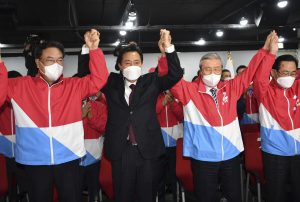South Korea held by-elections for mayoral posts in Seoul, the capital, and Busan, the country’s second largest city, on April 7. Oh Se-hoon and Park Hyung-Joon from the conservative People Power Party (PPP) won landslide victories. They will now serve the remaining 15 months of the previous mayors’ terms, until the regular cycle of local elections is restored.
In South Korea, by-elections held before general or presidential elections are regarded as bellwethers. Presidential elections will be held on March 9, 2022. In a country where presidents can serve only a single five-year term, a defeat by the president’s party in such by-elections accelerates the lame-duck period.
The defeat in both mayoral contests in Seoul and Busan is particularly humiliating for the ruling Democratic Party (DP). The two positions were made vacant by accusations of sexual harassment brought against the then-incumbents, both members of the DP, in 2020. While former Busan Mayor Oh Geo-don stepped down from his position, Park Won-soon, the former mayor of Seoul, took his own life in July last year after a former secretary accused him of sexual harassment. The fallout from the dual scandals split South Korean society. Park has been especially popular, owing to his successful urban reform agenda.
The ruling party and the government were themselves divided. Those trying to plow ahead on the Democratic Party’s agenda saw the scandals as an opposition plot to hamper the government. Others prioritized their beliefs in gender equality and thus distanced themselves from the actions and the image of the two mayors. Young voters, especially young women in their 20s, did not perceive such episodes as an opposition plot seeking to delegitimize the ruling party’s political and moral image, but as testament to still-pervasive problems of gender inequality in South Korea.
The fall of the mayors in South Korea’s two main cities required by-elections. A scandal-ridden campaign followed.

































